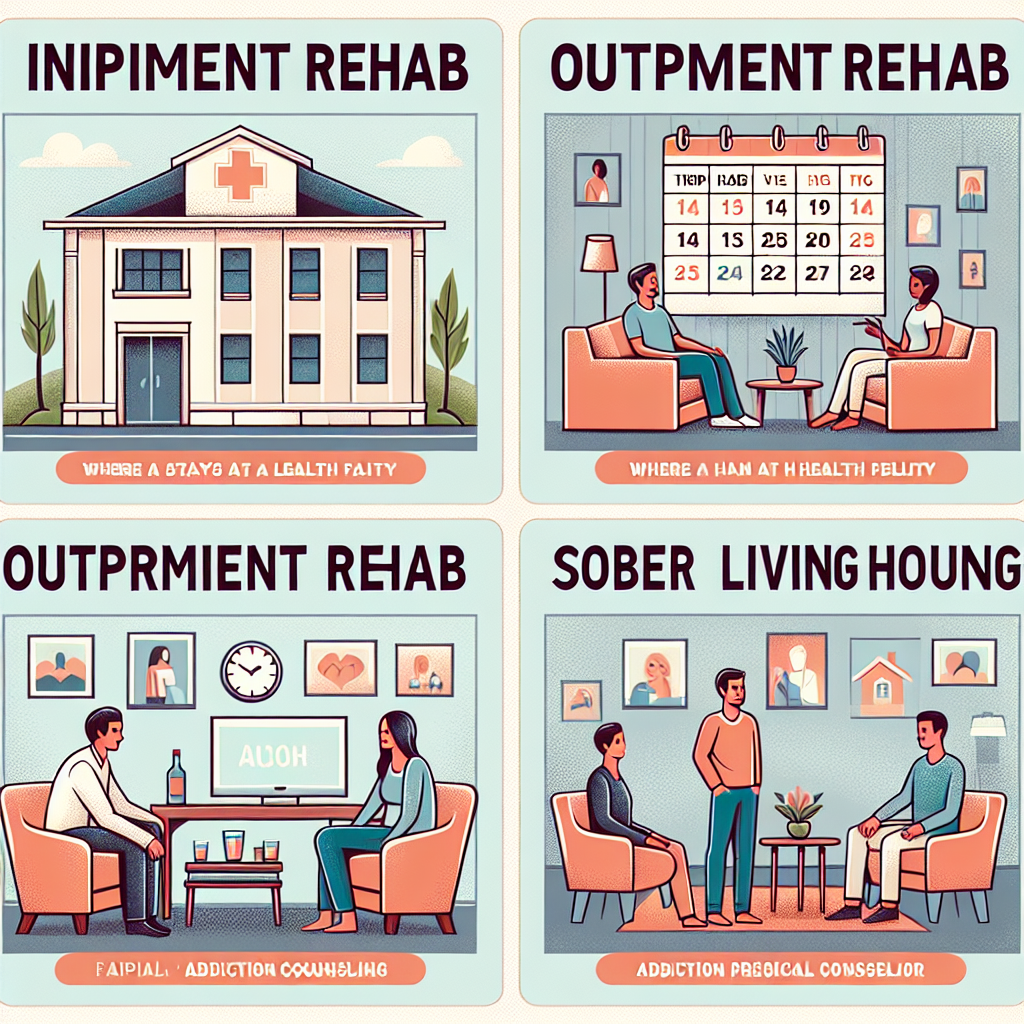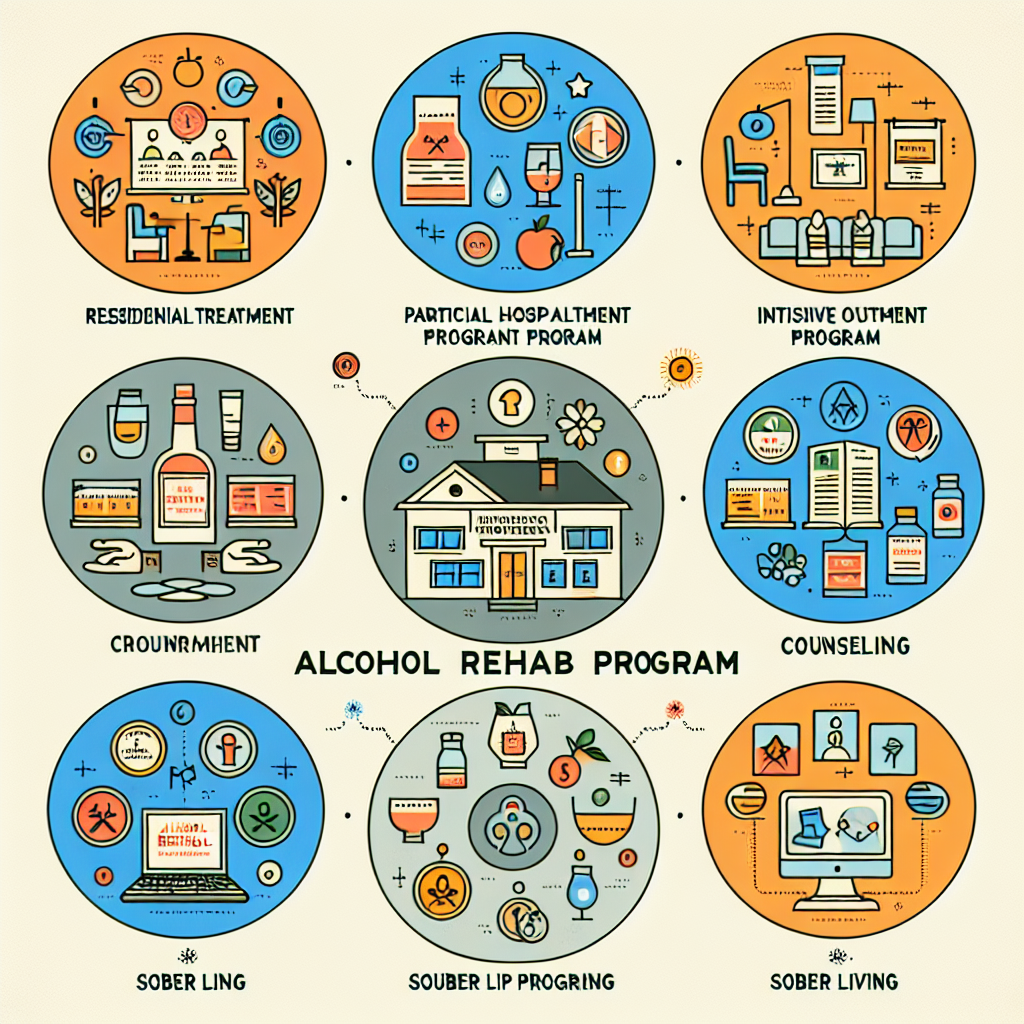-
Table of Contents

“Discover the Path to Recovery: Exploring Inpatient, Outpatient, and Holistic Alcohol Rehab Programs.”
Introduction
Alcohol rehab programs come in various forms, each tailored to meet the unique needs of individuals struggling with alcohol addiction. These programs can be broadly categorized into inpatient rehab, outpatient rehab, residential treatment, intensive outpatient programs (IOPs), partial hospitalization programs (PHPs), and detoxification services. Inpatient rehab involves staying at a facility for a specified period, providing a structured environment with 24/7 medical and emotional support. Outpatient rehab allows individuals to live at home while attending scheduled treatment sessions, offering flexibility for those with work or family commitments. Residential treatment is similar to inpatient rehab but often focuses on long-term care in a non-hospital setting. Intensive outpatient programs provide a higher level of care than standard outpatient services, requiring more frequent visits. Partial hospitalization programs offer intensive treatment during the day but allow patients to return home at night. Detoxification services are often the first step in the rehab process, helping individuals safely withdraw from alcohol under medical supervision. Each type of program has its own set of benefits and is designed to address different levels of addiction severity and personal circumstances.
Inpatient Alcohol Rehab Programs: Comprehensive Care and Structured Environment
Inpatient alcohol rehab programs offer a comprehensive approach to overcoming addiction, providing individuals with a structured environment that fosters recovery and personal growth. These programs are designed to address the multifaceted nature of alcohol dependency, ensuring that patients receive the medical, psychological, and emotional support they need to reclaim their lives. By immersing individuals in a controlled setting, inpatient rehab programs create a safe space where they can focus entirely on their recovery journey, free from the distractions and triggers of everyday life.
One of the primary benefits of inpatient alcohol rehab programs is the round-the-clock medical supervision they provide. This continuous care is crucial, especially during the initial detoxification phase, which can be physically and emotionally challenging. Medical professionals are on hand to manage withdrawal symptoms, administer medications if necessary, and monitor patients’ overall health. This level of care not only ensures safety but also helps to alleviate the discomfort associated with detox, making the process more manageable and less daunting.
In addition to medical support, inpatient rehab programs offer a range of therapeutic interventions designed to address the underlying causes of addiction. Individual therapy sessions provide a confidential space for patients to explore their personal struggles, traumas, and triggers with a trained therapist. These sessions are instrumental in helping individuals understand the root causes of their addiction and develop healthier coping mechanisms. Moreover, group therapy sessions foster a sense of community and shared experience, allowing patients to connect with others who are facing similar challenges. This camaraderie can be incredibly empowering, as it reminds individuals that they are not alone in their journey.
Furthermore, inpatient alcohol rehab programs often incorporate holistic therapies that promote overall well-being. Activities such as yoga, meditation, art therapy, and physical exercise are integrated into the daily schedule, encouraging patients to explore new ways of managing stress and emotions. These holistic approaches not only enhance physical health but also contribute to mental and emotional resilience, equipping individuals with a well-rounded toolkit for maintaining sobriety.
The structured environment of inpatient rehab programs is another key component of their effectiveness. Patients follow a daily schedule that includes therapy sessions, educational workshops, recreational activities, and personal time for reflection. This routine helps to instill a sense of discipline and purpose, which can be particularly beneficial for those who have struggled with the chaos and unpredictability of addiction. By establishing a stable and predictable daily rhythm, inpatient programs create a foundation upon which individuals can build a new, sober lifestyle.
Moreover, the immersive nature of inpatient rehab allows for a focused and uninterrupted recovery process. Being removed from familiar environments and potential triggers enables patients to fully concentrate on their healing without the distractions of daily life. This separation from external influences is often essential for breaking the cycle of addiction and fostering long-term recovery.
In conclusion, inpatient alcohol rehab programs offer a comprehensive and structured approach to overcoming addiction. Through continuous medical supervision, individualized and group therapy, holistic treatments, and a disciplined daily routine, these programs provide the necessary tools and support for individuals to embark on a transformative journey toward sobriety. The immersive environment not only ensures safety and stability but also empowers patients to discover their inner strength and resilience. By committing to an inpatient rehab program, individuals take a significant step toward reclaiming their lives and building a healthier, more fulfilling future.
Outpatient Alcohol Rehab Programs: Flexibility and Continued Support
Outpatient alcohol rehab programs offer a flexible and supportive approach to recovery, making them an attractive option for many individuals seeking to overcome alcohol addiction. These programs are designed to provide comprehensive treatment while allowing participants to maintain their daily responsibilities, such as work, school, or family commitments. This flexibility is one of the key advantages of outpatient rehab, as it enables individuals to integrate their recovery journey into their everyday lives, fostering a sense of normalcy and continuity.
One of the primary components of outpatient alcohol rehab is individual counseling. During these sessions, participants work one-on-one with a licensed therapist to explore the underlying causes of their addiction, develop coping strategies, and set achievable goals for their recovery. This personalized approach ensures that each individual’s unique needs and circumstances are addressed, promoting a more effective and sustainable recovery process. Additionally, individual counseling provides a safe and confidential space for participants to express their thoughts and emotions, which can be incredibly therapeutic and empowering.
Group therapy is another essential element of outpatient rehab programs. These sessions bring together individuals who are facing similar challenges, creating a supportive and understanding community. Group therapy offers participants the opportunity to share their experiences, learn from others, and build a network of peers who can provide encouragement and accountability. This sense of camaraderie can be incredibly motivating, as it helps individuals realize that they are not alone in their struggles and that recovery is possible with the support of others.
Outpatient programs also often include family therapy, recognizing the crucial role that loved ones play in the recovery process. Family therapy sessions aim to improve communication, rebuild trust, and address any dysfunctional dynamics that may have contributed to the individual’s addiction. By involving family members in the treatment process, outpatient rehab programs help to create a more supportive and understanding home environment, which can significantly enhance the chances of long-term recovery.
In addition to therapy, outpatient alcohol rehab programs typically offer a range of educational workshops and classes. These sessions cover topics such as the science of addiction, relapse prevention strategies, and healthy lifestyle choices. By providing participants with a deeper understanding of their condition and practical tools for managing it, these educational components empower individuals to take control of their recovery and make informed decisions about their health and well-being.
Another significant advantage of outpatient rehab is the continued support it offers even after the formal treatment phase has ended. Many programs provide aftercare services, such as ongoing counseling, support groups, and alumni events, to help individuals maintain their sobriety and navigate the challenges of post-rehab life. This ongoing support is crucial, as it helps to reinforce the skills and strategies learned during treatment and provides a safety net for individuals who may be at risk of relapse.
Ultimately, outpatient alcohol rehab programs offer a flexible and supportive pathway to recovery, allowing individuals to address their addiction while continuing to fulfill their daily responsibilities. By combining individual counseling, group therapy, family involvement, educational workshops, and ongoing support, these programs provide a comprehensive and holistic approach to treatment. For many individuals, this balance of structure and flexibility can make all the difference in achieving and maintaining long-term sobriety. With the right support and resources, recovery is not only possible but also within reach, inspiring hope and resilience in those who embark on this transformative journey.
Q&A
1. **Inpatient Rehabilitation Programs**: These programs require patients to live at the rehab facility for the duration of their treatment, providing a structured environment with 24/7 medical and emotional support.
2. **Outpatient Rehabilitation Programs**: These programs allow patients to live at home while attending treatment sessions at a rehab facility during the day or evening, offering more flexibility for those with work or family commitments.
Conclusion
Alcohol rehab programs can be broadly categorized into inpatient rehab, outpatient rehab, partial hospitalization programs (PHP), intensive outpatient programs (IOP), and residential treatment. Inpatient rehab involves staying at a facility for a period of time, typically ranging from 28 days to several months, and provides intensive, structured care. Outpatient rehab allows individuals to live at home while attending treatment sessions multiple times a week. Partial hospitalization programs offer a middle ground, providing intensive treatment during the day while allowing patients to return home at night. Intensive outpatient programs are less intensive than PHPs but still require a significant time commitment. Residential treatment is similar to inpatient rehab but often focuses on long-term care and may include therapeutic communities. Each type of program offers different levels of support and intensity, catering to the varying needs of individuals seeking recovery from alcohol addiction.



